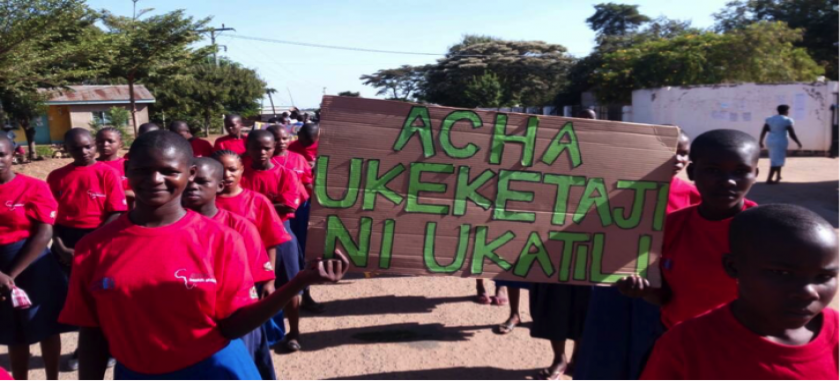
International Day of Zero Tolerance for FGM: Let’s build a society where women and girls will be free and safe from FGM
On February 6 every year the world comes together to call for eradication of the Female Genital Mutilation (FGM). Correspondingly the Legal and Human Rights Centre joins the world to campaign for the same in Tanzania.
Since its establishment in 1995, Legal and Human Rights Centre has been working hard to see the eradication of this ruthless cultural practice by carrying out numbers of awareness campaigns to empower the communities practicing FGM on the impact of FGM. Apart from awareness campaigns the LHRC has been working closely with responsible stakeholders counting local government authorities, police force and the judiciary to hold FGM perpetrators into account. LHRC has also been engaging with communities practicing the tradition in Singida, Manyara, Dodoma and Mara in a bid to make its efforts successful.
Amid commemoration of the International Day of Zero Tolerance for FGM in 2018, the Legal and Human Rights Centre keeps calling on communities practicing FGM to abandon the tradition, as it is totally unlawful and against principles of human rights. Female Genital Mutilation deprives girls/women’s rights to health, security and physical integrity, right to be free from torture and cruel, inhuman or degrading treatment, and their right to life particularly when the procedure results in death.
The government should strictly enforce laws against FGM perpetrators to address gender discrimination and inequalities and foster attainment of a just and equitable society.
Quick Facts About FGM in Tanzania
According to the Tanzania Demographic Health Survey 2015/16:
- In Tanzania 10% of girls or women have been subjected to female genital cutting/mutilation (FGC/M) despite it being illegal;
- FGC/M prevalence in rural areas is more than double that in urban areas. The highest percentages of circumcised women are in Manyara (58%), Dodoma (47%), Arusha (41%), Mara (32%) and Singida with (31%) respectively;
- Aspects of female circumcision: Eighty-one percent of circumcised women reported that some flesh was removed from their genitals, and 7% were infibulated. Eighty-six percent of women’s circumcisions were performed by traditional agents;
- Age at circumcision: Thirty-five percent of circumcised women age 15-49 were circumcised before age 1 and 28% were circumcised at age 13 or older;
- Prevalence among girls age 0-14: According to their mothers, less than 1% of girl’s age 0-14 are circumcised. Girls are more likely to be circumcised if their mothers were circumcised;
- Opinions about FGC/M: Among the 86% of women who have heard of FGC/M, 95% believe that the practice is not required by their religion and that the practice should not be continued;
Why does Female Genital Mutilation Happen?
Gender inequality and discriminatory social, cultural and religious norms are factors in why this harmful practice takes place. These include the idea that it preserves chastity, cleanliness, family honor and saves a girl for marriage. These beliefs stem from a perceived need to control female sexuality.
This issue requires sensitive handling if we are to persuade families, communities and religious leaders that FGM is not a necessary part of a girl’s coming of age ritual and, ultimately, that it will no longer be accepted or tolerated.
What are the consequences of FGM?
Procedures can cause severe bleeding and problems urinating, and later cysts, infections, infertility as well as complications in childbirth and increased risk of newborn and maternal deaths.
The lasting psychological effects on victims can be traumatic, often leading to long-term mental health issues and sexual dysfunction.
What does the law provide on FGM?
FGM is illegal in Tanzania as provided for under the Law of the Child Act 2009 - (the written laws (miscellaneous amendments) (no.2) act, 2016) sec 158A; furthermore the Penal Code Cap 16 – Section 169A criminalizes FGM; the Constitution of URT 1977 article 12 – 13 provides for non-discrimination on the base of sex, age, gender or race;
The National Plan of Action to End Violence against Women and Children 2017 – 2022 provides for protection of girls and women from harmful practices and calls for adherence to the existing laws and regulations;
Human Rights Efforts:
FGM is recognized as a human right violation and it is contrary to human rights conventions that protect women and children from cruelty and violence and ensure them "bodily integrity" and access to health care, education, and self-realization. Some of these conventions are:
- The Universal Declaration of Human Rights (1948)
- The United Nations Convention on the Rights of the Child (1959)
- The African Charter on Rights and Welfare of the Child (1990)
- The United Nations Convention on the Elimination of All Forms of Discrimination Against Women (1992)
- The United Nations Declaration on Violence Against Women (1993)
- The World Conference on Human Rights, Declaration and Programme of Action, Vienna (1993)
- The United Nations High Commission on Refugees, Statement Against Gender-Based Violence (1996).
What should be done to end FGM?
We need to build a strong synergy from grassroots to national level engaging political, religious and traditional leaders; civil societies; medical and education practitioners; policy and law enforcers; girls and boys;
We need to invest on continuous awareness raising and sensitization to bring about positive and protective social behavior which will have respect for human dignity;
The government should be fully engaged and must allocate necessary human and financial resources to eliminate the practice;
We need to have well established, functioning and accessible bodies to ensure there is rule of law and all perpetrators are brought to justice;
Spread the message
Let’s build a society where women and girls will be free and safe from FGM
